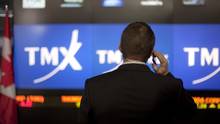
Canada’s main stock index opened slightly lower on Wednesday, while BlackBerry Ltd shares received a sharp boost after an arbitration panel ruled that chipmaker Qualcomm Inc must refund it $814.9-million in royalty payments.
The Toronto Stock Exchange’s S&P/TSX composite index was down 27.92 points, or 0.18 percent, at 15,69919 shortly after the open, as its heavyweight financial, energy and materials sectors all lost ground.
Blackberry shares were up 16.85 per cent to $12 in early trading.
The Canadian dollar strengthened on Wednesday to a nine-day high against its U.S. counterpart ahead of a Bank of Canada interest rate decision, supported by higher prices of oil, one of the country’s major exports.
The Bank of Canada is widely expected to hold rates at 0.50 per cent when it releases its interest rate decision and Monetary Policy Report at 10 a.m. ET.
The strength of recent domestic data has pointed to a pickup in Canada’s economy. But the central bank has been skeptical about the sustainability of the improvement and has worried about “significant uncertainties” that weigh on the outlook.
“We expect that concern about possible protectionist trade measures from the U.S. will continue to be highlighted as a key near-term risk to growth,” said RBC Capital Markets in a research note this morning.
The Canadian dollar was trading at $1.3314 to the greenback, or 75.11 U.S. cents, stronger than Tuesday’s close of $1.3332, or 75.01 U.S. cents.
The currency’s weakest level of the session was $1.3339, while it touched its strongest since April 3 at $1.3307.
U.S. stocks opened slightly lower on Wednesday amid lingering fears of geopolitical risks and as investors prepared for the first rush of corporate earnings on Thursday.
The Dow Jones Industrial Average was down 20.84 points, or 0.1 per cent, at 20,630.46, the S&P 500 was down 2.93 points, or 0.12 per cent, at 2,350.85 and the Nasdaq composite was down 2.88 points, or 0.05 per cent, at 5,863.89.
The United States launched missiles at a Syrian airfield last week to retaliate a deadly chemical attack on civilians. The strikes pushed President Donald Trump, who came to power in January calling for warmer ties with Syria’s ally Russia, and his administration into confrontation with Moscow.
Meanwhile, Chinese President Xi Jinping called on the U.S. for a peaceful resolution with North Korea, which has warned it would launch a nuclear attack if provoked by the United States, as a U.S. Navy strike group headed toward the western Pacific.
Investors are closely watching the quarterly earnings to support lofty valuations on Wall Street following a rally fueled by bets on Trump’s pro-growth agenda. The big banks unofficially kick-off the season on Thursday, with results due from JPMorgan , Citigroup and Wells Fargo.
“It would be very important what they (banks) offer as forecast because stock prices imply better times ahead and investors are looking for assurances and positive forecasts to be issued,” said Rick Meckler, president of LibertyView Capital Management in Jersey City, New Jersey.
Gold prices were flat but remained close to the highest level hit in November. The dollar index was also little changed, while oil prices edged up slightly.
Comments from Dallas Federal Reserve Bank President Robert Kaplan will be parsed for clues on interest rate hikes and the Fed’s plans to trim its balance sheet. Kaplan is expected to speak at 10:00 a.m. ET.
Brent oil extended gains into an eighth straight session on Wednesday, having recovered nearly all last month’s losses, after Saudi Arabia was said to be pushing its fellow OPEC members and some rivals to prolong supply cuts beyond June.
Brent crude futures were up 23 cents at $56.46 a barrel, having touched a one-month high of $56.65 earlier. If the day’s gains hold, it will be the longest winning streak for Brent since February 2012.
U.S. West Texas Intermediate (WTI) crude futures were up 18 cents at $53.58 a barrel, on track for a seventh straight session of gains.
OPEC countries cut oil output in March by more than they pledged, according to figures the group published in a monthly report on Wednesday, as it sticks to an effort to clear a supply glut that has weighed on prices.
Saudi Arabia, de-facto leader of the Organization of the Petroleum Exporting Countries, has told other producers that it wants to extend the coordinated production cut beyond the first half of the year, the Wall Street Journal reported.
“Given yesterday’s developments in the oil market it is rather surprising to have seen limited price gains across the board,” PVM Oil Associates analyst Tamas Varga said.
“Maybe the weekly EIA data … made buyers cautious,” Varga said. “Or maybe the sluggish stock market performance put a lid on yesterday’s price strength but we should not be surprised to see the oil market make amends today.”
OPEC and other producers, including Russia, have pledged to cut output by around 1.8 million barrels per day (bpd) during the first half of 2017 to rein in oversupply.
Fearing a loss of market share, Saudi Arabia is shielding its most important customers in Asia from the cuts, continuing to supply them with all contractual volumes.
In the United States, production and inventories are surging.
The government’s Energy Information Administration (EIA) said on Tuesday U.S. 2018 crude output <C-OUT-T-EIA> would rise to 9.9 million bpd, from 9.22 million bpd this year.
With demand expected to rise by 340,000 bpd in 2018, that would leave increasing amounts of U.S. oil for export or storage.
U.S. crude inventories hit a record 535.5 million barrels this month.
Official U.S. production and inventory data will be published later on Wednesday by the EIA.
[“Source-theglobeandmail”]


